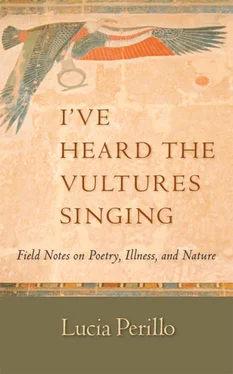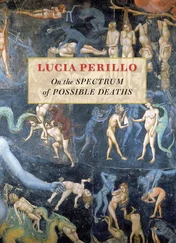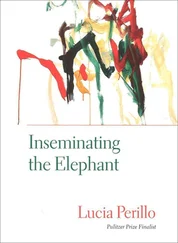I write down: screaming turns into chirping if you let time expand. That’s what happened to me, when I think of all the screaming I used to do whenever I thought about my future. Time expanded, and my screams turned into chirps.
3
Each night, they need to eat the better part of their weight in insects. With their wings unfolded, they are mostly skin, half pornography and half baby bird, and this leaves their bodies exposed to the night air, which means they need to eat a lot of calories. And so they eat to keep flying, and so they fly to keep eating. What we call a vicious circle.
4
A famous essay, “What Is It Like to Be a Bat?” was published in 1974 by a philosopher named Thomas Nagel. The essay is not so much about bats as about the problem of imagining any alien consciousness. Nagel chose bats because they occupy a limb high enough on the evolutionary tree that they clearly possess consciousness, and yet they perceive the world primarily through sensory apparatus that’s completely unlike our own. Our attempts to define echolocation in human scientific terms tell us nothing about what it’s like for a bat to be a bat. “Even if I could by gradual degrees be transformed into a bat,” Nagel says, “nothing in my present constitution enables me to imagine what the experiences of such a future stage of myself thus metamorphosed would be like.”
Since I’ll never know what it’s like to be a bat — I mean, I’m not an idiot; I know I’ll never know — Sandra and I are free to pursue our game, which is not so much a knowledge game as a child’s game of imagining. Two women lying on a stranger’s lawn — no, that’s wrong: one of them is simply “parked”—trying to see bats, trying to imagine bat-ness. I beam my thoughts into the sky, listening for an echo.
5
A week later, I’m at the matrimonial roost, out at the old log dump on Woodard Bay: the trail here is an old road that’s been gated off, so I can wheel the mile to the water, through darkening woods of sword ferns growing under the ancient mossy trees.
What strikes me first, when I come out at the clearing by the inlet, is the diamond moiré pattern of the surface, a fishnet of black on silver that wobbles as the twilight flexes itself against the bay. Looking north, you can see where the inlet opens into bigger water, and the sky is lighter there.
The bats live under a trestle, on top of which a railroad used to run, hauling logs away after they were floated here by tugboat. Its boards weathered and splintering, the trestle has been surrounded by a tall barbed-wire fence from which “Danger High Voltage” signs now hang. At dusk the bats will fly the ten miles to town, where the freshwater in the lake provides a better supply of insects.
The bat guy happens to show up here tonight — I think he thinks I’m stalking him, though tonight he speaks to anyone who wants to listen. The bat club from Seattle didn’t show up for their tour because the freeway was too backed up for most of them to make the drive south. The only person who got through is an older man whose eyes blink as though they’re accustomed to a deeper dark, his pale hair tufted around his ears. He fiddles with his own bat detector hanging around his neck, as he tells me how the bats have sex in autumn but how fertilization of the egg is delayed until the spring. He shows no compunction about speaking of bat sex, even though I’ve come here with my friends’ young boy and the vocabulary makes me blush.
He says it’s a mystery, how the sperm are stilled. How the female lets them know when they’re free, in spring, to storm the fortress of her egg. When he uses the word hibernaculum to describe the winter roost, this new word puts me into a heightened sensory state. I feel as though I’ve never seen such lilac-light before, or at least I’ve never so appreciated being in its presence, as the great blue herons croak from their nests in the trees.
When I ask how the bats carry bugs from the lake to their young here — I mean, do they carry the food like a plug of tobacco inside their cheeks? — the bat guys look at me like I’m a fool. Bats are mammals (well, of course I knew that). It shows me how much I’ve still been thinking of them as birds, regurgitating for their young. Instead, the three thousand females living here nurse their pups from their bat-breasts, after they emerge from hibernation and give birth — one pup per bat. The mothers need to eat their weight in insects to make enough milk, which is why they will make the long trip to the lake more than once each night. Little factories turning mosquitoes into milk. But I have trouble processing this information, hung up as I am on the idea of bat breasts. Twice as many breasts as pups.
The bat guys spar with each other in their own knowledge game, flinging around the terminology, the Latin names, Myotis this and Myotis that. They compete over numbers, who has seen how many bats of what species in what state in how many abandoned churches. I like the idea of bats being drawn to holy places (it makes me think of a drawing I’ve seen of Lucifer, looking like a hybrid of man and bat, caught at a sad moment, his wings drooping on the ground).
The two bat guys have a hard time speaking to us laymen because they have trouble gearing themselves down. I can almost smell their flywheels smoke, what with the friction between what they know and the version of it that the rest of us can understand. They tolerate us because they are so full of facts that they’ll explode if they don’t get the chance to eject some. But I think they aren’t eager to let too many people in on the secret of this place, whose light would be ruined by too many spectators filling it up with chatter.
The silver of the water surface intensifies when the trees grow dark, and just when you think you might pass out if there were to be a further silver increment — that’s when the bats begin to fly. The first one looks like a stunned bird moving in a daze above the picnic table and across the clearing. Long intervals come between them at first, but pretty soon time speeds up and bats start whipping through the air. We count to 250 in thirty seconds, the black threads weaving the twilight into a darker gauze from which the night is made. It takes maybe thirty minutes for all the bats to exit. In a squeaky voice, the child I’ve come here with reports on how he can feel his hair being lifted.
My last question for the bat experts is why the bats would choose a place so far from the lake, when there are many other abandoned piers in town because the timber industries that once ringed the waterfront have gone out of business. The bat guys say that no one knows; maybe it’s the size of the cracks between the boards here. Bats like to squeeze into not too large a crack , they say; like animals about to be slaughtered, or like some autistic children, they feel secure when they’re confined. Conversely, then, I wonder how vulnerable they feel when flying, and if this is why they restrict themselves by following such specific flight paths to the lake, after they stream in such precise columns from both sides of the trestle.
There’s a diminishment that comes when the spectacle is through. How unbearable, this forced return to ordinary life. On the way back to the car, my friends’ son holds the flashlight as we march along the road, the huge trees and the giant ferns invisible now. All we are is human, night-blind and wingless. Un-sonared. Then the night turns less than three-dimensional when the batteries in the flashlight die.
6
I was skeptical when the bat man told me to go down Rogers Street and look at this particular tree and at this particular alley, but here they are and there they go: flying toward all the nymphs waiting at the lake. Later that night, when all the indigo bleeds out of it, a woman comes barreling down the alley in her pickup truck, headlights off. She’s gunning for a guy who’s moving like a dustrag in the shadow of the privet hedges.
Читать дальше











![Various - Birds and Nature, Vol. 12 No. 5 [December 1902]](/books/745517/various-birds-and-nature-vol-12-no-5-december-thumb.webp)
![Various - Birds and Nature Vol. 11 No. 2 [February 1902]](/books/745533/various-birds-and-nature-vol-11-no-2-february-1-thumb.webp)